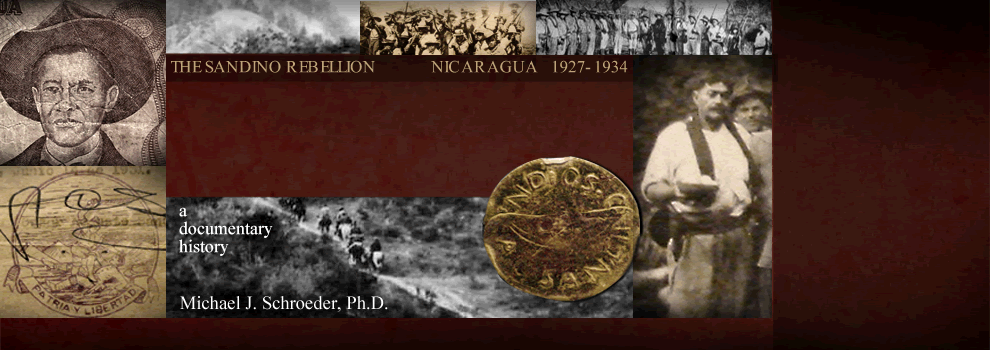|
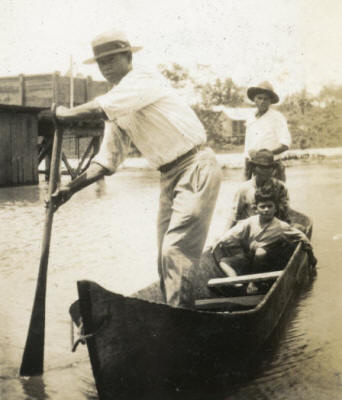 THIS IS THE SECOND PAGE OF DOCUMENTS FOR THE FIRST HALF OF 1929
on Nicaragua's Caribbean Coast
region, housing materials dated during the 38 days from February
1 to March 10.
THIS IS THE SECOND PAGE OF DOCUMENTS FOR THE FIRST HALF OF 1929
on Nicaragua's Caribbean Coast
region, housing materials dated during the 38 days from February
1 to March 10.
Especially noteworthy here
are the 16-page letter from
Bluefields medical doctor J. L.
Marchand to the editor of The
Nation in New York denouncing
the Marines’ arrogance & penchant
for torture and other unsavory
practices (4 Feb.). The radiograms
on General Manual María Girón
Ruano’s capture also merit attention
(on Giron’s statement before his
execution by a kangaroo bush trial,
see the
TOP 100 PAGE 27).
The Bluefields Weekly
continues to decry the banana tax —
and describes Sandino as being "on
the warpath" & in decidedly
unflattering terms — while the
various intelligence reports,
memoranda, and reports bespeak
mainly the Marines' concern with
locally-rooted unrest unrelated to
the EDSN. As the 12 February
Periodic Intelligence Report notes,
“A report received of Sandino
recruiting among laborers of farms
on RIO GRANDE RIVER was investigated
and it appears that most of farm
laborers lost within last month have
gone to PANAMA looking for more
lucrative work.” Captain
Peard’s Feb. 13 “Resume of
Achievements of Guardia Nacional”
offers a crisp summary of the
“organization and establishment of
the Area of the East” (starting a
year earlier on 28 Feb. 28), along
with some interesting details on
Marine perceptions of local people’s
reception of the Guardia. The
28 February radiogram on the 80
mahogany cutters leaving Waspuk for
the Patuca River zone in Honduras is
apparently the first time the name
of Adolfo Cockburn surfaces in
Marine-Guardia records.
|
|
PERIOD MAPS
|
|
1894 mosquito
shore

27 MB,
library of congress
|
1920s
Standard Fruit

6.5 mb,
US National archives
|
1928 Rio wanks
Patrol

3 mb, us
national archives
|
1931 Moravian

2.4 mb,
comenius press
|
|

|
1 February
1929 (1702).
Radiogram from
Capt. M. A. Edson, Poteca, to
Major H. H. Utley, Puerto Cabezas.
"TWENTY
FAMILIES FORMERLY HIDING IN MOUNTAINS
NEAR GUIGUILI HAVE BEEN GRANTED
PERMISSION TO BUILD HOUSES NEAR POTECA
STOP ALL MEN DESIRE WORK AND ARE
AVAILABLE AS BOATMEN IF NECESSARY TO
FORWARD RATIONS ABOVE HERE STOP STATE
MOVE HERE FOR FEAR OF BANDITS STOP 1702"
|
|
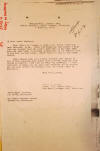
|
1 February
1929.
Letter from Major
H. H. Utley, Puerto Cabezas, to
Señor Julio Monterey, Pal Punta,
Nicaragua.
"Dear Senor
Monterey: Your letter to Captain M.
Rose, U.S. Marine Corps has been
forwarded to me. After investigating
this matter I find from our records that
all claims submitted by you have been
paid and that there is nothing
outstanding at the present time. ...
Both Captain Rose and Captain Matteson
have spoken of you in very complimentary
terms, having stated that you have
always co-operated with them in every
way possible. I wish therefore to thank
you for your past services and to
commend you for your active co-operation
with the Marine Corps in Nicaragua. ..."
|
|

|
4 February
1929 (1303).
Radiogram from
Capt. M. A. Edson, Poteca, to
Major H. H. Utley, Puerto Cabezas.
"FOLLOWING
RECEIVED FROM BRIGADE QUOTE 1103
HANNEKEN CAPTURED GENERAL JIRON ALONE
TODAY STOP PROMISED HIM LIBERTY IF HE
WOULD GUIDE MARINES SO THEY CAN GET
SANDINO STOP HANNEKEN PROCEEDS WITH
TWENTY ONE MEN TONIGHT TO ATTACK SANDINO
WHO IS LOCATED BETWEEN MURRA OAKLAND AND
CONGOJAS AS ART UNDER MY 8604 1302
CONFIRMS STOP 1303"
|
|
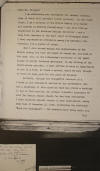
|
1.
4 February 1929.
Letter from Dr. J. L. Marchand,
Bluefields, to Oswald Garrison Villard,
Editor, The Nation, New York City, p. 1.
"Dear Mr.
Willard: ¶ I am addressing you
personally for several reasons, some of
which will probably become apparent. In
the first place, I am a citizen of the
United States of a family not unknown in
Western Pennsylvania – you will find me
registered in the American Medical
Directory – and a long time resident of
the East Coast of Nicaragua where I have
practiced my profession among its
naturals, the Costenos, for a number of
years. ¶ How I ever missed making the
acquaintance of The Nation during the
last two years is beyond me, but such is
the case; for, as the independent
scrivener of our small colony of mostly
fettered Americans, to say nothing of
the inarticulate naturals, I have
striven to miss no opportunity to put in
a word, at times a myriad, where we have
thought it would do some good for the
cause of decency. ¶ Latterly, through
the thoughtful interest of a friend in
the diplomatic service of our
government, who has a knowledge of this
question that has proved a handicap to
him in this service, my perhaps
excusable ignorance of what The Nation
really stands for has been dissipated. I
have received several issues of your
publication, among them that of December
12, 1928, containing the editorial ‘Hope
for Nicaragua?’ – the question mark
being aptly put. ¶ This . . . "
|
|
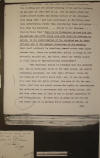
|
2. 4 February 1929.
Letter from Dr. J. L. Marchand,
Bluefields, to Oswald Garrison Villard,
Editor, The Nation, New York City, p. 2.
" . . .
[section missing] partly as follows: 'We
can stand the general rottenness, the
strafing and the double-crossing of the
native Costenos; we are more or less
used to it. But we cannot stand for the
deliberate murder and brutal torture of
the prisoners from among them - and such
periodicals as The Nation have been
understating rather than overstating
these activities" . . . But, when the
Secretary . . . writes to the Chairman .
. . that he feels that ‘there is no
foundation in fact for the allegations
set forth since such acts would be
contrary to policy, to the
indoctrination of the enlisted men by
their officers and to the general
principles of the service.’ there must
certainly be something damned rotten
some place between here, where our
actualistic policy is being so
persistently carried out, and there,
where our verbal policy is still being
so sanctimoniously proclaimed.’ ¶ ‘The
Secretary should be informed that the
enlisted men, and in particular those of
the navy proper, are mostly upstanding
gentlemen, but that their officers,
those who are detailed for active short
duty, are, to use the words of a very
wise old petty officer, the scum of the
two services, that they are mostly
morons who really do indoctrinate the
enlisted men in accordance with our
verbal policy, but who then order some
of them to act in direct opposition to
the indoctrination. We have seen it
going on for all but two years; and it
is growing worse instead of better, so
that . . .
|
|
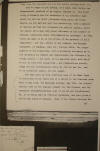
|
3. 4 February 1929.
Letter from Dr. J. L. Marchand,
Bluefields, to Oswald Garrison Villard,
Editor, The Nation, New York City, p. 3.
" . . . that even
the enlisted men are now openly talking
about it.’ ¶ And we began to get action,
of a kind, days before the departmental
promises of an inquiry reached us. The
first thing noticeable was the cessation
of all authentic talk among the natives
about prisoners being given the third
degree, as the marines call the
institution; then a captain of marines
arrived who outranked the culprit
captain, although the latter still had
very great influence in the conduct of
affairs, especially where intimidation
is concerned – he even tried the game on
me in the office of the governor of this
department – and the, wonder of all
wonders, our Brigade Commander, at
Managua, came out, through Wells, the
propagandist of the despoilers, with a
sickening statement as to how carefully
he himself had indoctrinated his
officers a la verbal policy – all quite
in the approved style with which we are
so very well acquainted – and
preparations quietly began for the
investigation which we did not ask for,
and, to be perfectly candid, did not
expect. ¶ The next move in this
notorious case of the East Coast is
mentioned in the beginning of a letter
to the Chairman under date of May 18th:
‘On Saturday evening, May 13th, the
culprit captain left by the regular
steamer for New Orleans, and the
community breathed a profound sigh of
relief and thankfulness. He, it is being
said by official spokesmen, has been
given a thirty day leave of absence.
Some of his former non-coms are of . . .
"
|
|
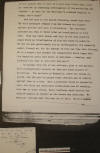
|
4. 4 February 1929.
Letter from Dr. J. L. Marchand,
Bluefields, to Oswald Garrison Villard,
Editor, The Nation, New York City, p. 4.
" . . . of the
opinion that it will be a very long
thirty days, that he ‘smelled’ an
impending investigation of his
activities and ‘ducked’ – so much for
the Secretary’s promised inquiry; it
simply isn’t done!’ ¶ And the next in
the second following, dated June 30th:
‘By this morning’s steamer from New
Orleans the culprit captain arrived once
more in Bluefields. The secretary
promised you that he would order an
investigation in this case. None has
taken place; and this is the only
possible place where an investigation of
this man would be possible. We did not
ask particularly for an investigation;
the community asked, through me, for the
removal of this man from this littoral.
He is a menace; and already the
tranquility which began with his
departure early last month is disturbed
. . . Besides, many Liberals will fear
to vote with him here.’ ¶ ‘A captain
with two of his officers, also of the
marines, were court-martialed recently
at Leon and found guilty of atrocities.
The naturals of Somatillo, where the
crimes occurred, had the guts to accuse
these officers and to testify against
them in a body. Such a procedure would
be impossible here; but there are
sufficient professional men of standing,
with two or three others, whose
testimony would convict the
culprit-captain as readily as the former
was convicted. We American citizens want
this man out of here. He is a menace to
. . . "
|
|
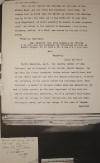
|
5. 4 February 1929.
Letter from Dr. J. L. Marchand,
Bluefields, to Oswald Garrison Villard,
Editor, The Nation, New York City, p. 5.
" . . . to our
own safety.’ ¶ This letter reached the
Chairman at his home in the Middle West,
and his reply was immediate, July 12th.
He stated that he would take the matter
up further with Washington by letter,
but that, as it was difficult to deal
with this Department, he would possibly
be unable to make progress until his
return to the capital in September – but
he was mistaken, action, of a kind, was
stated by the end of the month: ¶ ‘Dear
Mr. Marchand: ¶ Cap. Madison vino esta
manana a mi oficina y mi dijo que era
encargado de investigar el case de
Benito Vargas. Yo lo vere a ud. A last 4
o 5 p.m. hoy. ¶ Afo, ¶ Sandoval. ¶ Julio
31/’28.’ ¶ Onofre Sandoval, LL.D., the
leading lawyer of this littoral, had an
interest in the victim, Venito Vargus.
He had been his former commander during
active hostilities, and it was really
against him that the marine activities,
of which the torturing of the latter
formed the principal part, were directed
– a matter of alleged hidden arms and
ammunition. He was it later proved, as
the most important of the only two
native professional gentlemen, out of a
probably half-dozen, who had the courage
of their convictions, who had not been
thoroughly cowed; and he had charge of
the case of Vargas. Sandoval . . .
"
|
|
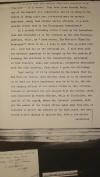
|
6. 4 February 1929.
Letter from Dr. J. L. Marchand,
Bluefields, to Oswald Garrison Villard,
Editor, The Nation, New York City, p. 6.
" . . . [line
missing] ‘I am glad that you
realize that this election is a ‘big
job’ – it is worse. They have given
General McCoy one of the meanest jobs
imaginable; and he is going to be,
indeed is being right now, obstructed
more by certain Americans, among them
several marine officers, to a much
greater extent than by the Nicaraguans
themselves!’ ¶ In a closely following
letter I took up the Cumberland plan and
discussed it in its relation to the real
Nicaraguan question, which, as I have
stated, The Nation’s ‘Hope for
Nicaragua?’ fails to do – I hope to take
this up later with you – good and all as
the editorial is. I also went into the
probable questions to be brought up for
the purpose of throwing the elections to
the Conservatives, especially in this
district, also, and naturally,
intimately associated with the real
question, from which I quote the
following: ¶ ‘And lastly, if it is
intended by the powers that be, New York
for choice, that General McCoy is to be
permitted to do what our state
department says he is to do, why has the
ranking officer of our marine forces on
this littoral, Costeno in sentiment but
now aligned with the Liberal party, been
stationed at Puerto Cabezas, while at
Bluefields, the capital of the region,
where the ‘Liberal’ governor, with all
the powers to the former office taken
away from him, is supposed to direct the
affairs of the East Coast, was stationed
a mere captain of marines who, with a
few choice satellites . . . "
|
|
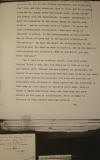
|
7. 4 February 1929.
Letter from Dr. J. L. Marchand,
Bluefields, to Oswald Garrison Villard,
Editor, The Nation, New York City, p. 7.
" . . .
satellites, did all in his power, openly
and above board, to give the lie to the
Stimson agreements, and especially the
‘free and fair election’ part of them,
and in so doing resorted to, among other
despicable acts, actual murder and
mayhem upon the defenseless ‘Liberal’
inhabitants to keep the community in the
proper state of fearful submission – and
he got away with it ‘since’, to quote on
high in Washington officialdom, ‘such
acts would be contrary to policy, to the
indoctrination of the enlisted men by
their officers and to the general
principles of the service.’ We know all
about the indoctrination of the enlisted
men; but what we want to know is, who in
the hell is indoctrinating the officers!
That is not Hayti, nor yet Santo
Domingo.’ ¶ ‘As I said in my previous
letter, they have given General McCoy a
mean job; and while he is busy at it let
him beware lest, through him and without
his knowledge, the skirts of our army be
smirched with the same filth as are
those of our navy and marine services;
for long and intimate acquaintance with
officers of these latter two has
convinced us that many of them cannot be
believed under oath, when it comes to
their activities here, and that they are
past-masters at the game of
double-cross, when it comes to officers
of even another American service . . .
'As . . . "
|
|
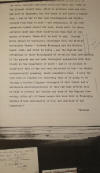
|
8. 4 February 1929.
Letter from Dr. J. L. Marchand,
Bluefields, to Oswald Garrison Villard,
Editor, The Nation, New York City, p. 8.
" . . . ‘As I
before stated, the East Coast is the
crux of the whole damnable
American-concocted mess; and, even if
any sort the Liberal ticket wins, which
is probably even now with any sort of
fairness, but the Coast is not given a
square deal – and so far it has been
hornswoggled and double-crossed from
soup to nuts – and especially, if the
Conservative ticket should win here,
which would be inconceivable under any
other supervision than that of our
marine officers, there will be hell to
pay. General McCoy should be thoroughly
conversant with the Miskito Convention
treaty – between Nicaragua and the
Miskito Coast, 1895, and still in force,
and the English law pertaining to those
Nicaraguans of so-called dual
nationality. If the general was not made
thoroughly acquainted with this treaty
at the department of state – and it is
dollars to doughnuts that it was not
even whispered to him – he should,
metaphorically speaking, smash
somebody’s face. I have the very best of
reasons for believing that it is going
to be through a further flagrant
disregard of this treaty and a
deliberate misinterpretation of this law
that efforts will be made to prevent the
Creoles and some of the Negroes from
voting, although all of these people who
were born in Nicaragua, whether of dual
nationality or not, are entitled to the
franchise.’ ¶ 'General . . . "
|
|
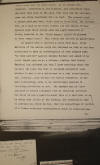
|
9. 4 February 1929.
Letter from Dr. J. L. Marchand,
Bluefields, to Oswald Garrison Villard,
Editor, The Nation, New York City, p. 9.
" . . . ‘General
McCoy will indeed do well to keep in
very close touch with the East Coast. It
is loaded with dynamite. Everybody in
the Interior, and especially those who
know that such is the case, will tell
him the contrary, even our state
department will do that. The general
needs a dammed good man here, right here
in Bluefields, the capital; and, as I
said in my first letter, not one marine
officer against whom there exists even
the least suspicion of having resorted
to the ‘third degree’ should be allowed
to even remain here.’ This letter was
written on August 22nd. ¶ On August 30th
I received a visit from Capt. Clyde
Matteson of the marine corps who
informed me that he had been authorized
to make an investigation of some charges
made ‘by some natives’ against Captain
Kendall and asked if he could depend
upon me as a witness, stating that
Doctor Sandoval had informed him that I
knew something about the matter! My
reply was that it depended altogether
upon whether it was to be a white-wash
or a real investigation and, possibly,
upon whether the native witnesses, if
any were forthcoming, were to be
convincingly assured of receiving
protection or not. The captain was at
first inclined to become indignant over
my skeptical attitude, but after we had
a heart-to-heart talk of a half hour or
so, he doing very little of the talking,
and practically only to convince me,
which he did, that the miscarriage of
justice of a former notorious
investigation which he conducted was due
. . . "
|
|
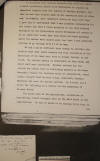
|
10. 4 February 1929.
Letter from Dr. J. L. Marchand,
Bluefields, to Oswald Garrison Villard,
Editor, The Nation, New York City, p.
10.
" . . . due
[section missing]. ¶ It appears that
Captain Matteson had received orders a
month previously direct from Washington
to conduct an impartial inquiry into the
conduct of Captain Kendall, but that he
had been ordered away by his superiors
here on other and, presumably, more
important duties at that very time. I
gave him to understand that I was
probably responsible for his orders and
that I would possibly be the only
witness available as the prospective
native witnesses all seemed to be so
completely cowed that they would not
know anything about the matter when
called upon; but that I was perfectly
willing to go through with it if he was.
¶ We had a quite difficult time trying
to convince the natives that they would
receive the full protection of the
Secretary of the Navy were they to
simply testify to the truth, the captain
aiding us materially in this work; and
about half were convinced. Several
refused for the ostensible reason that
by testifying against an American
Moncada’s chance for election would be
jeopardized, others simply thought that
we were lying, especially Captain
Matteson who wore the marine uniform. On
October 2nd I wrote the following in a
letter for the attention of General
McCoy: ¶ ‘To quote some of the
Moncadistas, Liberalism is manifesting
itself strongly here on the East Coast
in the registration. So far it seems to
be running fully four to one . . . "
|
|
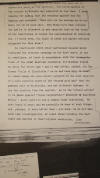
|
11. 4 February 1929.
Letter from Dr. J. L. Marchand,
Bluefields, to Oswald Garrison Villard,
Editor, The Nation, New York City, p.
11.
" . . . one
[section missing] considerable
skepticism, that it is about the same
way in almost all parts of the interior.
The investigation of the conduct of
Kendall was completed in due time. I
have reasons for saying that the
evidence against him was damning and
unshaken. What will be the outcome we do
not know, not do we much care. His wings
have been clipped; but how he is
tolerated in any capacity here on the
scene of his beastliness is beyond the
comprehension of everybody but, it would
seem, the class of naval and marine
officers delegated for this work.’ ¶ In
practically every other particular
General McCoy conducted the election
campaign on the East Coast, if not in
compliance, at least in accordance, with
the recommendations of the older
American residents; but Kendall stayed
on until the bitter end – and it was
bitter, indeed, for the former ‘bully of
Bluefields,’ as he had been wont to
boast, to remain among his once abject
subjects in the mean capacity of a mere
election clerk of the ‘damned good man’
that the general sent to Bluefields, and
not to Puerto Cabezas, the run the
election from the capital. As to the
‘prompt action’ to be taken against
‘those responsible,’ promised by
Secretary Wilbur – Quien sabe! to use a
common local expression. We have heard
of none; and we generally do hear of
such things but, perhaps, it were better
thus – you know, we do not dare hold
real investigations, at least those
touching the East Cost and carried to
their logical conclusion. Like
revolutions. . . "
|
|
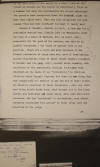
|
12. 4 February 1929.
Letter from Dr. J. L. Marchand,
Bluefields, to Oswald Garrison Villard,
Editor, The Nation, New York City, p.
12.
" . . .
revolutions [section missing] in the
East Coast do not amount to a damn –
look at the former by Stinson and the
latter by Cumberland! There is a reason;
but even you hypothesists who do not
understand the question have recognized
these two farcical plays for what they
really were. Have you also recognized
the much lauded ‘free and fair election’
for what it really was? ¶ Donald J.
Kendall, Captain U.S.M.C., a free man
but a noticeably worried one, finally
left for Washington under the wing of a
major of marines, who, no doubt, will
ostensibly for the good of the service,
see that it is quietly exonerated – but
there is another side to the question.
There are a score and more Costenos of
the Liberal persuasion at least here
who, most of them bearing plainly
discernible scars of their former
beastly treatment by Kendall and his
gang, still shudder while speaking with
reluctance of the unendurable physical
torturings they underwent at the hands
of our ‘protectors,’ in which an
‘electric chair largely figured; but
there is one thing that they simply will
not mention to any one not of their
breed; the Sadistic practices of their
tormentors – only one other case being
widely known here, that brought out in
the local courts, and published in local
sheet, when some half-dozen prisoners,
who had ‘confessed’ to our marines, were
almost instantly pronounced ‘not guilty’
by their trial jury and acquitted by the
judge. ¶ As . . . "
|
|
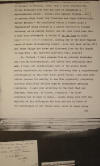
|
13. 4 February 1929.
Letter from Dr. J. L. Marchand,
Bluefields, to Oswald Garrison Villard,
Editor, The Nation, New York City, p.
13.
" . . . As
[section missing] particular area, since
his sadistic treatment at the hands of
Kendall in February, 1928, when I first
examined him, he has developed into what
may here be designated a myxoedematous
eunuch – consult you medical friends –
not to mention other local body
blemishes and organ dysfunctions. Javier
Escobar – who repudiated before a former
judge a ‘confession’ wrung from him as a
marine prisoner by inhuman tortures, as
he plainly stated, and who then lived
less than a half hour afterwards, a
victim of la ley fuga in plain sight of
the entire community, causing one of the
most flagrant cases of naval
whitewashing extant – were very much
better off! And these things are known
and discussed from the Rio Grande to
Cape Horn – Mr. Hoover’s good-will tour,
indeed! ¶ Mr. Villard, I have gleaned
from my personal knowledge and from my
correspondence the latter with
meticulous care and, I hope, not
injudiciously some of the points which
mostly constitute our reasons for
believing that a congressional
investigation in this case would prove
futile – and none have better reasons
for wanting to see this apparently
perplexing question definitely settled
than we independent American residents.
I call your attention to the fact that
our Chairman, whom you, of course,
recognize – my first intention was to
name no names – lately swung over with
the majority of his colleagues who were
and are in favor of the continuance of
our forces here, until at least after
the . . . "
|
|
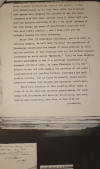
|
14. 4 February 1929.
Letter from Dr. J. L. Marchand,
Bluefields, to Oswald Garrison Villard,
Editor, The Nation, New York City, p.
14.
" . . . the
[section missing] censured for this. As
we look at it, he simply no longer holds
a purely hypothetical view of the
matter. I call your attention also to
the fact that, although the elections
just passed were probably the greatest
of all the jokes connected with this
mess, General Frank R. McCoy left here
with the deserved enconiums of all – the
first instance of the kind during our
years of questionable relations with
this poor little republic – and I have
given you the probably reasons for these
phenomena. ¶ Since 1894, by deplorable
connivance, and from 1909, by criminal
example, we have been ‘raising’ two
generations of Nicaraguan politicians
the height of whose ambition is loot;
and the practice of this doctrine here
is, not without reasons, considered as
being purely ‘American.’ Until we have
educated another generation or two to a
political conception of a somewhat
different order, to leave Nicaragua to
its own devices we are not only begging
the question of our grave responsibility
but inviting further, inevitable and
much greater trouble. Let us first be
honestly imperialistic before we condemn
that ancient and honorable institution.
¶ There is a solution of this question
which seems to those of us who have had
intimate acquaintances for years among
both Nicaraguan and American
politicians, and have, upon so many
occasions, been face to face with our
intervening. . . "
|
|
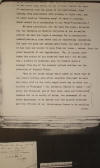
|
15. 4 February 1929.
Letter from Dr. J. L. Marchand,
Bluefields, to Oswald Garrison Villard,
Editor, The Nation, New York City, p.
15.
" . . .
intervening [section missing] to be
simplicity itself. This plan has three
virtues: it has never been tried, by us;
it would remove the bone of contention
from the grasp of the politicians, thus
leaving them practically with nothing to
fight over, and it would need no
‘standing army’ to carry it through,
which should be a desideration to you
‘anti-imperialists.’ ¶ We have
heretofore, for the last two years,
directed all our energies in drastic
criticism of our so-called policy; we
have not begun a campaign for a
constructive rehabilitation, a plan
based upon no theoretical conception,
but upon the hard and unassailable facts
too many of which it has been our policy
to keep from our press – indeed, from
the great majority of our legislators.
We, of course, have taken due notice of
our promised ‘new era,’ but we have had
a surfeit of promises; and, to finally
quote a message from one of the several
letters written for the attention of
General McCoy: ¶ ‘Once of the chief
things which makes us think that we can
expect nothing else after election than
what we have had since 1912 is the truly
magnificent way in which our writer in
Nicaragua – for instance, Harold N.
Denny – lie about the financial end of
this mess, make our interested bankers
out to be worthy of halos, the personnel
of our state department to be imbued
with the highest altruism and the
officers of our intervening forces to be
suckling doves. . . . "
|
|
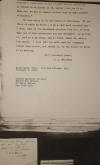
|
16. 4 February 1929.
Letter from Dr. J. L. Marchand,
Bluefields, to Oswald Garrison Villard,
Editor, The Nation, New York City, p.
16.
" . . . doves.
[section missing] residents think that
we had at last thought seriously of
trying to be honest in the matter; but,
as it is made out, we are so damned
perfect that we make ourself ridiculous.
’ ¶ We need help; so do the people of
Nicaragua. If you think it worth my
while - I am a very much occupied man –
I shall take up the Nicaragua question
with you, or with that one of your
associates you may designate, as we view
it, just as I am doing, and no doubt,
shall do, with a few others. I hope that
you will read the foregoing rather long
letter, and reread it, in the spirit in
which it is written. ¶ Very sincerely
yours, ¶ J. L. Marchand"
|
|

|
5 February
1929 (1515).
Radiogram from
Major H. H. Utley, Puerto
Cabezas, to Capt. M. A. Edson, Poteca.
"8605 YOUR
JIG STOP MY 8604 1303 SHOULD READ
HANNEKEN PROCEEDS WITH TWENTY ONE MEN
TONIGHT TO ATTACK SANDINO WHO IS LOCATED
BETWEEN MURRA OAKLAND AND CONGOJAS A S A
R T O 1515"
|
|

|
5 February
1929 (1830).
Radiogram from
Major H. H. Utley, Puerto
Cabezas, to Commander Southern Sector
Bluefields.
"FOLLOWING FROM
POTECA QUOTE MSG MAJOR UTLEY STOP DROP
MESSAGE TODAY STATES JIRON DOES NOT KNOW
TRAILS AND CANNOT LEAD HANNEKEN TO
SANDINOS CAMP STOP GUIDES ARE BEING
OBTAINED AND NORTHERN AREA PATROLS ARE
MOVING FROM SANTA CRUZ COMA QUILALI COMA
SAN ALBINO COMA JICARO AND JALAPA INTO
THE AREA MURRA DASH CONGOJAS RIVER DASH
GUIGUILI RIVER DASH CHIPOTE STOP
POLLOCKS ROUTE NORTH AND COVERS
HEADWATERS OF TAMIS RIVER WHILE EDSON
PROCEEDS UP GUIGUILI RIVER AND TURNS
NORTH INTO AREA BELIEVED TO CONTAIN MAIN
BODY OF BANDITS AS SHOWN BY RECENT
REPORTS AND EDSONS LAST PATROL STOP
EDSON DESIRED ME TO REMAIN IN COMMAND AT
POTECA UNTIL HIS RETURN SIGNED HALL
1830"
|
|

|
8 February
1929 (1305).
Radiogram from CO
Marines Matagalpa to CO 5th
Regiment Managua (info Utley & Edson).
"FOLLOWING FROM
JINOTEGA 0508 REQUEST C O POTECA BE
ADVISED THAT RUPERTO HERNANDEZ LADISLAO
MORA NOW REPORTED HERE THERE BY MARINES
WERE MEMBERS OF THE BANDIT CONNECTED
WITH THE SAN MARCOS AFFAIR JEFE POLITICO
HERE WISHES THEM BROUGHT TO JINOTEGA
1305"
|
|
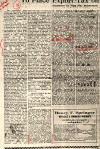
|
9 February
1929.
"To Place Export Tax on Bananas,"
The Bluefields Weekly, p. 1.
"The undersigned
Chief clerk of the Honourable Senate
certifies that this is a true copy of
the 7th Clause of the minutes of the 8th
Session celebrated on Wednesday night at
7o’clock, twenty sixth of December,
1928, which literally says: ¶ “the
clause:--the opinion of the committee
which received for study an initiative
from the Honourable House of Deputies to
place a tax of two cents on every bunch
of bananas exported from the country was
read in second debate. Said bill was
rejected in the in the first debate in
the Session celebrated December 26,
1928.—Taken into consideration, for
discussion Senator Sandoval took the
floor and denouncing the bill he said
that it was unjust, that on the Atlantic
Coast the planters aid a high price and
although not directly but indirectly
there was always a ax which they paid.
All the necessities of daily life
whether food or clothing on the Atlantic
Coast have to be imported from the U.S.
and sometimes from Europe, naturally
enough the working man has to pay the
duties with which the merchants are
charged at the Customs. The planter, on
account of the topography of the Coast
where it rains the entire year, has to
use stronger shoes and clothing which he
has to change two or three times a day
on account of the rains; he has to use
mosquito bar; and his food must be
varied and better. Whereas in whatever
part of the interior f the Republic all
the food products are obtained from
their own soil, they have six months
summer, they use one pair of trousers
and one shirt; for breakfast they have
plantain and beans, for dinner they
beans and plantain. With this I want to
demonstrate, gentlemen, that the planter
has his additional ax in the business
which he exploits and that the planter
of the Coast pays logically much more
than any other section of the Republic.
Senator Sandoval concluded asking that
the bill under discussion be rejected
because of its oppressiveness and
injustice to the industry and planters
of the Atlantic Coast. Senator Hooker
supported Senator Sandoval’s speech and
spoke lengthily illustrating to the
Honourable House the different banana
prices.—Senator Castellon (Hildebrand)
defender of the project supported the
bill saying amongst other things that he
could not see any reason why the bananas
should not be taxed, all the other
products of the country, such as coffee,
sugar, tobacco, etc. have an export tax;
that if there were no taxes the
Government would soon disappear for the
State lives and has to , by the taxes,
which the national industries pay, he
concluded asking that the bill be
approved. Senator Collado supported what
Senator Castellon (Hildebrando) said,
and thereby supported the bill.—Senator
Lopez Irias pronounced against the bill,
he spoke on this industry showing the
difference between the Republic of
Nicaragua and that of Honduras in
relation to the facilities which the
latter named has to take out its
products and to carry the provisions
which the business and planters need; it
is not so in Nicaragua where the means
of communication with the Coast is
almost null. The President, Senator
Cuadra (J. D.) defended the bill.
Senator Callejas manifested that he was
commissioned to reorganize the Atlantic
Coast after the glorious incorporation
and that he encountered turtle fishing
and being national property he taxed it,
that he found a sawmill of national
property which was not paying a tax and
he taxed it with three dollars for every
1000 ft. of lumber sawed, and so on
successively, he went on taxing, each
industry that belonged to the Nation. He
never thought of taxing bananas as it is
the strength of the greater part of the
Nicaraguans. He concluded denouncing the
bill. Senator Sandoval added to the above
arguments the following: he said, that
this tax would be doubly unjust to the
natives of Nicaragua on the Coast the
majority of whom are banana planters; we
have for example one of the strongest
Companies of the Coast as is the
BRAGMANS BLUFF LUMBER COMPANY which
would not pay at tax for the exportation
of banana in reason of their contract
which exempts such taxes; there are the
creoles who also would not have to pay
this tax, protected by the
Harrison-Altamirano Treaty. Consequently
this oppressive tax would only fall upon
the native sons of the country. The Bill
was declared sufficiently discussed and
voted down in the final debate. At the
request of the interested party I extend
the present certificate in the Secretary
Office of the Honorable Senate in
Managua, at three o’clock p.m. the tenth
of January nineteen hundred and twenty
nine. ¶ CHIEF CLERK of the Honourable
Senate House. ¶ The undersigned Chief
clerk of the Honourable Senate House
certifies that this is a true copy of
the 3rd. clause of the Act of the 20th
Session celebrated at 8o’clock a.m. on
the eight of January nineteen hundred
and twenty-nine, which literally says:--
¶ The opinion of the committee which
received for study an initiative from
the Honourable House of Deputies to
place a tax of two cents on every bunch
of bananas exported from the country was
read in second debate. Said bill was
rejected in the first debate in the
Session celebrated December 26, 1928.--
Taken into consideration, for discussion
Senator Sandoval took the floor and
said.—First, I have to protest against
the procedure of the Senate for it is
unconstitutional to submit a bill of law
which was rejected in first debate for a
second discussion. Although, it is true
that all projects of law should be
submitted to two debates, that is to
form law, but when the bill is rejected
it should not be submitted for a second
debate except at the following
legislature. In respect to the banana
tax I do not agree with it because the
Republic after the disastrous war is not
a condition to support more
taxes—especially the one on the only
banana region which is the Atlantic
Coast—the almost exclusive region of the
murderous struggle—because according to
the financier Mr. Cumberland, Nicaragua
is thriving to the point where taxes are
not necessary to assist its most
positive necessities not even for the
construction of a railway for the
Atlantic. According to the Political
Constitution the tax would not be
extended to all; in accordance with
Harrison-Altamirano Treaty the ancient
inhabitants of the Mosquito Reserve are
exempt from all direct taxes upon their
persons, property or business, and as a
great part of the planters are exempted
only the Nicaraguans and not the creoles
would be affected. Apropos of this the
British Government felt authorized in
the case of Mrs. Crowdell, a hotel
proprietress, when a Municipal tax was
collected from her at Bluefields, to
protect herself according to the Treaty
and when the Municipality embargoes and
sold at auction a house of hers the
British Consul at Bluefields reclaimed
said house which was given back. The
Minister of Foreign Affairs of the
Nicaragua amongst other arguments, said
that there was not equality amongst
Nicaraguan citizens according to the
procedure but he was answered by the
representative of His Majesty, that
Nicaragua could abolish the direct taxes
in the Ancient Mosquito Reserve to
re-establish equality.—I am certain that
if the banana-tax passes, gentlemen,
Representatives, it will not stand for
the Creoles and Indians because they
will appeal to the before mentioned
Treaty. ¶ Also there are other persons
who are exempt from taxes over all the
fruit they may produce simply because
they have so agreed with the Government
of this Republic; there are others the
Bragmans Bluff Lumber co., Dr.
Casteazoro and Messr. Tijerinos. The
first of Bragmans Bluff Lumber co.,
although their contract is for pines,
got a clause inserted exempting them
from all exportation taxes over their
products, and as they have now gone in
for agriculture it is possible that this
clause wil be extended to cover the
banana tax.—referring to the second
Casteazoro and Messrs. Tijerino who have
contracts for several years which insure
them against taxes; it is clear and
evident that unusual interest shown
outside of the house by persons who have
no connection whatever with the
Government or with the tax debated, to
the point of insinuating to various
Senators the convenience of such a tax,
is due as I am certain, to a desire to
give more value to the Tijerino
concession, it is simple to understand
that if the banana has an exportation
tax, and the Tijerino contract has a
guarantee of exemption this latter will
be enabled to obtain a good price in his
speculation.—Gentlemen Representatives,
I have read in “La Prensa” an article of
Mr. Adan Cardenas which declares
stimulating [sic] that bananas are not
taxed while all the other national
products are. This is indefensible
because the banana pays its taxes
indirectly abound is a growing industry,
it may be true, that in past years about
eight ships loaded with bananas left
Bluefields weekly, but now only four
half loaded ones leave in the same time,
on account of the cyclones, the
revolution and the Panama disease..—this
industry for the present is just
beginning; the 300,000 bunches of
bananas which are exported monthly do
not signify much in comparison with the
millions which Costa Rica, Honduras and
Guatemala export. I know that powerful
companies such as the United Fruit
Company are desirous of establishing in
Nicaragua but I am certain, likewise,
that they will abandon their intentions
when they know than an oppressive ax
hangs over the exportation of bananas.
Consequently I beg that the Honourable
Senators of which this Houses is formed
may vote against this project for the
benefit of our country.—Senator Hooker
taking the floor spoke lengthily
demonstrating by statistics that the
Atlantic Coast paid eighteen Dollars and
forty-five against Three Dollars and
seventy-two cents which the rest of the
Republic paid per capita. Demonstrating
and manifesting by this that the Coast
is sufficiently taxed. He said that it
is frequently heard that the complete
nationalization of the Atlantic Coast is
necessary but he noticed with regret
that every time the Government
remembered said Coast it was to apply
more burden in the form of taxes. He
dwelled on the fact, in his discourse
that the banana tax would be a direct
tax because each planter would be
compelled to pay the tax with exceptions
of the Indians and Creoles who are
favoured in this particular by the
Harrison-Altamirano Treaty; therefore
the tax would fall over the Nicaraguans
commonly called Spaniards by the people
of the Coast; and he concluded saying
that the opinion was firm that the
application of such a tax would favour
the Tijerino Contract which according to
the terms is free from all export tax on
their products natural or manufactured .
. ."
|
|
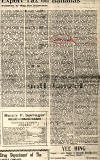
|
9 February
1929.
"To Place Export Tax on Bananas,"
The Bluefields Weekly, p. 2.
|
|
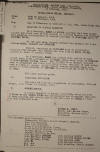
|
12 February
1929.
Periodic Intelligence Report, 20
January-9 February,
Major H. H.
Utley, Puerto Cabezas.
"Map: Map of
Nicaragua by Clifford D. Ham, 1924,
scale 1/500 00 ¶ 1. LOCATION OF HOSTILE
ELEMENTS. ¶ On 4 February, EDSON at
POTECA reported that from native reports
and signs such on last patrol, he
believed Sandino and Madriage with
possible concentration of bandits
northeast of OCONGUAS; north of GUIGUILI
RIVER. ¶ On the same date, Brigade
advised that Sandino was located between
MURRA, OAKLAND and CONGOJAS. ¶ Patrol,
operating in CHONTALES area on
information received from Brigade that
bandits had been seen at SANTA ISABEL,
reports no signs of bandits found. ¶ On
8 February, EDSON had contact with
bandits on high ground eight miles
northwest of BENTILLO, seven miles south
of OCONGUAS on OCONGUAS-SAN BARTOLA
trail. Band thought to be Sandino
although camp of Altamirano was found
four miles south. Strength of band
estimated at sixty to eighty. After
contact bandits withdrew along high
ground to south probably to BENTILLO
Area although may cross to south of
COCO. ¶ All other sectors quiet. ¶ 2.
POLITICAL SITUATION. ¶ The new Jefe
Politico, Department of Bluefields,
Gilberto Lacayo, took office 1 February,
1929. ¶ 3. MISCELLANEOUS ¶ A report
received of Sandino recruiting among
labors of farms on RIO GRANDE RIVER was
investigated and it appears that most of
farm laborers lost within last month
have gone to PANAMA looking for more
lucrative work. ¶ HAROLD H. UTLEY, ¶
Major, U.S. Marine Corps, ¶ Commander,
Eastern Area, ¶ Nicaragua."
|
|
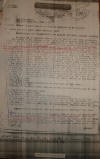
|
1.
13 February
1929.
Resume of Achievements of Guardia
Nacional on East Coast,
Captain R. W.
Peard, Bluefields, p. 1.
"Reference: (a)
Your radio 11007 February 1929. ¶ 1.
ORGANIZATION AND ESTABLISHMENT OF AREA
OF THE EAST, GUARDIA NACIONAL. ¶ In
response to repeated demands on the part
of the civil population on the east
Coast it was decided in the later part
of January 1928 to establish a Force of
the Guardia Nacional on the Atlantic
Coast with Headquarters at Bluefields.
It was decided that no enlisted men
would be sent from the interior and that
the force would be recruited on the East
Coast. On February 28, 1928, the
following officers arrived at Bluefields
from the interior with orders to
establish initially the Area of the East
and the Division of Southern Bluefields:
Major A. B. Sage, Lieutenant J. H.
Smith, Cadets W. J. Stone and L. J.
Bowersox, line officers and Cadets G. C.
Gilpin and L. Petersen, Medical
Officers. Area, equipment and clothing
sufficient to fit out the detail of the
one hundred men accompanied these
officers. Headquarters were established
in Bluefields, but it was decided that
until recruits could be enlisted, placed
under training and instructed in police
duties, no move would be made to take
over the police activities. The officers
were sent on various reconnaissance
missions, a barracks was obtained at El
Bluff for use as a recruit depot, and
enlistments were started. The first man
was enlisted on 13 March 1928 and the
police of El Bluff taken over on that
date. Training has been progressive at
El Bluff, the men are put through close
and extended order, fire the target
practice course and then ready to be
sent to Bluefields for police duty.
Following are the dates on which civil
police were relieved at the places now
under control of the Guadia. ¶ El Bluff,
13 March 1928. ¶ Bluefields, 3 May 1928.
¶ [Rama?] 11 June 1928, outpost
established at Guadalupe 15 July 1928. ¶
Laguna de Perlas, 17 August 1928. ¶
Puerto Cabezas, 27 September 1928,
outpost at Wawa Central established 29
June 1928. ¶ San Juan del Norte, 14
September 1928. ¶ Rio Grande Bar, 15
November 1928 ¶ La Luz, 13 November
1928, outpost to Tumarin established. ¶
In addition to the above regular posts
there was established at Cruta, Nic.
(Disputed Territory), a post of one
officer and four men from September 11,
1928, to November 5, 1928, during the
registration and election. There was
also a post established at Sarapiqui
(San Juan del Norte River) from
September 15, 1928, to November 5, 1928.
¶ 2. IMPROVEMENT OF LOCAL AND SANITARY
CONDITIONS THROUGHOUT THE AREA. ¶ It is
a truism to state that at every town in
which the Guardia have arrived and
established themselves, the conditions
have improved. This is a matter of
common knowledge on this Coast. The
public, the press, even the offenders
arrested for violation of the laws, have
so testified. When the Guardia arrived
at Rama there were no street lights, and
grass was growing in the street . . . "
|
|
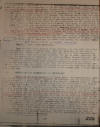
|
2.
13 February
1929.
Resume of Achievements of Guardia
Nacional on East Coast,
Captain R. W.
Peard, Bluefields, p. 2.
" . . . cattle
were being slaughtered in the most
convenient places. Inside of one month
the change in the appearance of the town
was so great that a person would not
recognize Rama as the same place. Lights
were installed, sidewalks repaired, the
Commandancia repaired, painted with the
regulation blue ad while colors, a
slaughter house installed and the
inhabitants unanimous in their praise of
the Guardia. It is a matter of fact that
whenever the Guardia has arrive at a
Commandancia that white wash and paint
follow and as this is done the village
population follow suit. Conditions on
this coast are absolutely different than
in the interior. Living on or near the
rivers as the greater part of the
population do so, with no communication
other than word of mouth, with water
transportation the means of travel, each
community is separate to itself. The
Guardia Nacional has been fortunate in
this respect in that the floating
population is very small and they are
able to familiarize themselves with the
inhabitants, to assist them in every way
possible and to make their lot a better
and more contended one by making a point
of personal contact with the citizens.
Wherever the Guardia has established
themselves the Medical Officers on duty
have made at least one monthly
inspection. By this means they have been
able on many occasions to render needed
medical assistance, and to point out the
remedy for certain bad sanitary
conditions. ¶ 3. RELATIONS WITH PUBLIC
OFFICIALS. ¶ From the very first arrival
of the Guardia here the civil officials
have been alert and eager to cooperate.
With the exception of the police
officials who were relieved and who
naturally felt or more less
antagonistic, there has not been a case
of a public official who has opposed,
privately or publicly the efforts of the
Guardia. The Jefe Politico, General
Estrada, and his successor, Señor
Lacayo, have both not only personally
issued instructions to the government
officials under their charge to
cooperate with the Guardia officers but
have made it a point to see that the
officials so instructed have done so.
The judicial authorities throughout the
Area have been very cordial in their
relations and have assisted the Guardia
in the preparation of cases brought
before the law. ¶ 4. SUPPRESSION OF
LAWLESSNESS AND SMUGGLING. ¶ There are
two large employers of labor here. The
Cuyamel Fruit Company and the Bragmans
Bluff Lumber Company. On the days that
the laborers are paid there had been,
before the arrival of the Guardia,
numerous cases of assaults and cuttings,
and other disorders. Cooperation with
the officials of the company has enabled
the Guardia to be present on boats and
other places, and as a result, when the
men are paid and before they could
accumulate sufficient liquor and become
troublesome, they were either sent home
or confined. Pay days now pass off
without incident. There was not nor has
been any group of notorious criminals on
this coast and the disorder has been
more in the nature of disagreements
between individuals. The establishment
of a post at San Juan del Norte has
undoubtedly prevented considerable
smuggling from Coast Rica into
Nicaragua. It has been impossible to
stop persons passing along the beach and
by requiring all masters of vessels to
report at the various commandancias
before departure and a check of the
ships passengers and cargo has made the
matter of smuggling a minor matter. The
most difficulty has been with the
illicit traffic in guaro along the
river. It is a fact, however, that while
the Guardia Nacional were in control of
the Hacienda Guards in this Area, the
sales of the Agente Fiscales, who deal
in the authorized augardiante, greatly
increased. This is indicative of the
fact that the sales of unlawful liquor
decreased . . . "
|
|

|
3.
13 February
1929.
Resume of Achievements of Guardia
Nacional on East Coast,
Captain R. W.
Peard, Bluefields, p. 3.
" . . . 5. COMBAT
REPORTS ¶ The Guardia in this area has
not engaged in any combats with the
bandit forces. The patrols have been
purely police and although numerous
arrests have been made they have been
for violations of police laws. ¶ H. W.
Peard."
|
|

|
17 February
1929 (1653).
Radiogram from
Commander Northern Area, Ocotal,
to Capt. M. A. Edson, Poteca.
"1116 OPERATIONS
MARINES AND TWO HUNDRED VOLUNTARIOS
PLANNED FOR MURRA DASH CHIPOTE AREA NEXT
WEEK PERIOD UNLESS INSTRUCTED CONTRARY
COVER POTECA RIVER TO CONGOJAS AND COCO
RIVER TO YACALWAS BETWEEN TUESDAY ONE
NINE AND THURSDAY TWO EIGHT PERIOD SANTA
CRUZ PATROL GUIGUILI PERIOD ORDERS BY
PLANE DROP TOMORROW 1653"
|
|
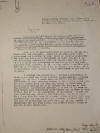
|
18 February
1929.
Letter from Major
H. H. Utley, Puerto Cabezas, to
Mr. H. Stanford London, Esquire, His
British Majesty's Charge D'Affaires,
Managua, p. 1.
"My dear Mr.
London: ¶ Yesterday I was visited by a
delegation of Meddusa chiefs from this
sector, asking my advice and assistance
on behalf of their people. It had to do,
of course, with the old question of the
provisions of the treaty whereby the
Mosquito Reservation became part of
Nicaragua and the eternal complaints
that Nicaragua has failed to live up to
their part of the agreement. ¶ They have
in mind submitting to General Poland,
Mr. Eberhardt, and yourself, materials
setting forth their grievances and
praying for your joint or several
intercession with the Nicaraguan
Government in their behalf. I am not
thoroughly conversant with all the
details, but as far as I can learn the
provisions of the treaty have not been
complied with. However it is a matter
which I consider outside of my
bailiwick, except in an advisory
capacity, and I am submitting this
account of this conference to you for
two reasons. ¶ I advised the chiefs that
a personal submission of their case
would be, in my opinion, preferable to a
written memorial, and that I would
endeavor to arrange for such a
conference if your numerous duties at
the Capital would permit your coming
here and stopping either at Bluefields
or Pearl Lagoon enroute so as to receive
the Indians of both the northern and
southern sectors. I am not at all sure
to what extent your Government would
desire you to move in this matter, but
if at all permissible it furnishes a
reason for your visiting us, which is
one objective, the other being that I
may have the benefit of your advice on
this question, unofficially and
confidentially. I noted, incidentally,
that the idea of presenting the case
verbally to your consul at Bluefields
did not find favor, the evident desire
being to lay the matter before you . . .
"
|
|
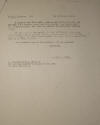
|
18 February
1929.
Letter from Major
H. H. Utley, Puerto Cabezas, to
Mr. H. Stanford London, Esquire, His
British Majesty's Charge D'Affaires,
Managua, p. 2.
" . . . I pointed
out that with a new president in Managua
and one who had recently come from this
coast, they might hope for an
improvement, but this suggestion
likewise met with no favor. ¶ If this
excuse for coming out is not sufficient,
come anyway. We will always be glad to
see you. Mrs. Utley says to tell you to
be sure to bring Mrs. London with you,
and the Horowitz’s join us in best
wishes. ¶ With kindest regards to
yourself and Mrs. London, ¶ Sincerely, ¶
HAROLD H. UTLEY."
|
|

|
18 February
1929 (0612).
Radiogram from
Capt. M. A. Edson, Poteca to
Major H. H. Utley, Puerto Cabezas.
"REQUEST
INFORMATION IF FOLLOWING NATIVES
RESIDENTS COCO RIVER PARTICIPATED SAN
MARCOS COLON MACARIO CALDERON COMMA
ISIDORE CUNO AND NICHO LANDERO PERIOD
ADVISE 0612" [NOTE: This probably refers
to the San Marcos murders of 1-2 Oct.
1928; see the
TOP 100, PAGE 22.
In fact none of these names
appear in the final report of the
incident; here Edson is probably
checking up on the veracity of an
informant.]
|
|
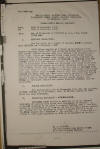
|
18 February
1929.
Intelligence Report, Periodic, 10-16
Feb., 1st Lt. W.
J. Whaling, Puerto Cabezas.
"Map: Map of
Nicaragua by Clifford D. Ham, 1924,
scale 1/500 00 ¶ 1. MILITARY OPERATIONS.
¶ The following is a report of Captain
EDSON’s contact near BENTILLO on 8,
February 1929: ¶ ‘8611 Edson reports as
follows quote Contact twelve hundred
February Eight with band estimated
twenty five stop Engagement lasted
fifteen minutes only stop Bandits used
Browning Automatic comma rifles and
dynamite bombs comma heavy firing during
entire combat stop Occurred high ground
eight miles northwest of BENTILLO comma
seven miles south of OCONGUAS on
OCONGUAS dash SAN BARTOLA trail stop
Band engaged thought to be Sandino
although camp of Altimirano later found
and destroyed four miles south stop
Total number bandits camped in vicinity
estimated sixty to eighty stop Returned
along high ground to south probably to
BENTILLO area although may cross to
south of COCO stop Marine casualties
none repeat none comma native guido
wounded through left knee evacuated
PUERTO CABEZAS via SANTA CRUZ and BOCAY
stop Bandit casualties not repeat not
known stop Full details by pick up stop
This patrol returned general vicinity
western BENTILLO attempt regain contact
stop POTECA to establish outpost two
squads vicinity GUIGUILI stop unquote
0910. ¶ 2. POLICE OPERATIONS. ¶ The
Guardia Nacional de Nicaragua took over
the policing of WAWA CENTRAL on 16
February, 1929 and Marine outpost at
that place has been withdrawn. ¶ 3.
POLITICAL SITUATION – MISCELLANEOUS. ¶
HONDURAS COAST situation calm but it is
the general consensus of opinion that
there will eventually be trouble. A
projected uprising of the Blue
Government turning over to the Rods
failed by concentration of Blue troops
and the ring leaders arrested. Causes
for the uprising by Blue Government were
not known. Two Blue leaders were
summoned to the capital, one of whom was
reported to have been appointed by Rods
as Commandante at Trujillo. ¶ W. J.
WHALING, ¶ 1st Lieutenant, U.S. Marine
Corps, ¶ Area Intelligence Officer."
|
|

|
22 February
1929 (0900).
Radiogram from
Major H. H. Utley, Puerto
Cabezas, to CO Marines Poteca, Bocay,
Garrobo.
"FOLLOWING
RECEIVED FROM CO FIFTH REGIMENT QUOTE
0521 ALTAMIRANO HAS A CAVE THAT HE HAS
BEEN KNOWN TO USE THAT IS FOUR MILES
WEST CACSA ON BOCAY RIVER THERE IS A
TRAIL FROM CASCA DIRECTLY TO THIS CAVE
ALTAMIRANO MARCHES TO GARROBO AND THEN
USES BOATS SOMETIMES USES TRAIL
PARALLELING THE BOCAY RIVER ON BOTH
SIDES CAVE IS IN VICINITY KNOWN AS TUNA
WALAN NOT SHOWN ON MAP 1110 UNQUOTE
0900"
|
|
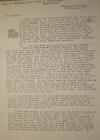
|
25 February
1929.
Letter from Capt.
M. A. Edson, Managua, to Major
H.H. Utley, Puerto Cabezas, p. 1.
"Dear Major: ¶
Please excuse the flowery stationery but
it is all that happens to be available
at this time. As Red has probably told
you, we have arrived in this shining
example of a thriving Latin American
metropolis – the Mecca of revolutionary
generals and what not. Not only did we
arrive, but rumor tells us that we also
took it by storm, but you will have to
talk to Guymen about that. True to form,
however, I could not stand up under
prosperity, and yesterday had another
touch of malaria, which delayed my
departure for the bush until Wednesday
morning. ¶ By this same mail you will
probably receive a copy of Confidential
Brigade Special Orders #11. One could
not ask for any more indefinite orders
than those. As I see them, and as the
verbal instructions referred to stated,
the sum and substance of such orders are
– ‘Go where you please, do what you
please – and return when you feel like
it. If then you feel like going into the
wilds again, it is alright with us, for
the rest of the time here you will be
foot loose and fancy free’. No
restrictions were put on the movements
whatsoever, no suggestions made as to
where or how they should be conducted,
except that Brigade be kept informed as
closely as possible with the general
plans and probable routes. Plan 3 (c) is
the basis of the idea, and the details
will be worked out as they arise. That
is about all there is to the proposed
patrol except that I have Brigade
permission to return to Poteca in time
to be ordered to the States soon after
the first of April, regardless of any
results obtained. As for these results,
please understand and pass on to all
others that there are no rash promises
made. Several other Marines have been
chasing these bandits around for some
two years without much to show for it,
so I am not saying we will do this or
that in five or six weeks’ time. But
that does not mean we will not try our
best. ¶ It is expected that I will be
ordered to rejoin my ship in New York,
proceeding via commercial transportation
via Puerto Cabezas and New Orleans. I
hope to be able to make the ship sailing
from either Bluefields or the port on
April 13th. If you can get me the names
of the ships leaving the two places on
that date, I would appreciate it. ¶ I
have been unable to dig out any dope
which you probably do not already know –
even if such a thing were possible. When
I called upon the General, he spoke
about the proposed movement of troops
westward of CUVALI and GARROBO. Other
than that he did not discuss the war.
The call was very short, the General was
quite tired, and someone else was
waiting outside. As Shearer has
undoubtedly passed on, the talk around
the cups at Brig Hdq that afternoon
seemed to indicate that the activities
in the E.A. would be curtailed very
considerably in the near future. The . .
. "
|
|
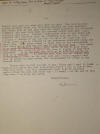
|
25 February
1929.
Letter from Capt.
M. A. Edson, Managua, to Major
H.H. Utley, Puerto Cabezas, p. 2.
" . . . General
may give you some more dope on this. The
conversation during business hours the
following morning was less emphatic and
rather gave me the idea that the ideas
expressed the afternoon previous may
have been what was desired rather than
what could actually take place. However
I did gather that it was hoped and
expected that aviation might be
withdrawn from the E.A. within a couple
of months or so, and that at about the
same time the forces there might be
reduced to two companies scattered along
the coast line. [Duly? obscured by
markings on "l"] Smith seems to think
that we are over-manned – that there is
no need for 600 men in the Eastern area
- that there is no need for Waspuc,
Bocay, etc., although he had no good
reply when asked what would happen to
our line of supply if they were
abandoned. It is the same old stuff of
no definite policy to look to or work
on. I do believe that when the cut
begins that it is going to start on the
east side and I would suggest that that
be borne in mind during the readjustment
of troops in the forward areas. ¶ Please
give my best regards to Mrs. Utley and I
want to thank both of you again for your
hospitality while I was in Puerto
Cabezas last week. You will undoubtedly
hear from me sometime again within the
next six weeks and – (I hope) – at the
end of that time when I am on my way
north. ¶ Respectfully, ¶ Edson"
|
|
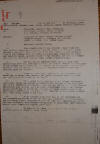
|
27 February
1929.
Complaint by Señor Macario Estrada
against Sergeant Dougald K. McGregor and
Corporal Buddie L. Booth, U.S. Marine
Corps, 2nd Endorsement by
Major H. H.
Utley, Puerto Cabezas, to Gen.
Feland, Managua.
"1. Returned,
contacts noted. ¶ 2. From examination of
the enclosed papers and from much
further investigation as its possible
without a transfer of the accused - one
from Poteca and the other from Quelleos
los Reyes – I am of the opinion that it
would be exceedingly difficult to prove
any specific charge against either of
the Marines, and that the statements of
the witnesses are, in part, biased
exaggerations. ¶ 3. The two men in
question while on M. P. duty were
exceedingly thorough, especially during
the period between the abolition of the
former police force and the arrival of
the enlisted men of the Guardia; when
the police of Bilway and adjacent
territory devolved entirely upon the
Marines. ¶ 4. These men have since been
[?] and convicted for undue use of
force, then reduced one grade, relieved
from M.P. duty and transferred to patrol
in the field. ¶ 5. It is noted that a
number of the alleged instances took
place during the period of election and
in view of the fact that one of the
Assistant Departmental Chairmen was
present in Puerto Cabezas throughout
that period, and that every conceivable
charge was brought either before him or
before me, and none of these charges
came to my knowledge; considerable doubt
as to the veracity of the charges
brought at a later date, exists in my
mind. ¶ 6. It is further noted that all
of the witnesses and the accusers had
access to me but that they preferred the
roundabout way of laying their
complaints before the American Minister,
and it was believed desirable from
several standpoints to discourage this
practice, except where direct and
logical means fail. ¶ 7. In view of the
above, it is recommended that no further
action to taken in these cases. ¶ Harold
H. UTLEY."
|
|

|
28 February
1929 (0730).
Radiogram from CO
Marines Cape Gracias to Major H.
H. Utley, Puerto Cabezas.
"SERGEANT MURPHY
TWO MARINES ONE NATIVE ARRIVED ON CARLOS
BOAT FROM WASPUC STOP EIGHTY NATIVES
MAHOGANY CUTTERS UNDER ADOLFO COCKBURN
OF SACLIN GOING UP COCO RIVER BY BARGE
TO TILBA FALLS AND OVERLAND TO MAHOGANY
CAMPS TO PATUCA HONDURAS HAS PASSPORTS
FROM HERE STOP 0730"
|
|
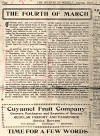
|
2 March 1929.
The Bluefields Weekly, p. 1.
"The
Fourth of March ¶ On Monday
next, --just two days hence,-- the
people of the United States of North
America,-one hundred and twenty
millions,--will acclaim their new
President,--a mighty man, selected to
rule over a great nation for the ensuing
presidential period. ¶ Mr. Herbert
Hoover, than whom, we feel justified in
saying, no better choice for guiding the
destiny of his great country could have
been made at this time, has already
begun his work of good will toward all.
¶ An American said of the immortal
Nicaraguan poet, Ruben Dario: “He is not
of Nicaraguan, nor of Central America,
nor of Latin America,--he is of the
world”. In like manner it might be said
of Mr. Hoover, from his thorough
knowledge of world conditions—he is not
of the United States,--he is of the
world. And indeed, in our opinion, it is
not the United States of North
America,--not continental and insular
America that will alone derive benefits
from the ascension of this recognized
able American to the presidency of his
country, but the world also will gain. ¶
With time conditions change and there is
no one who would dare deny the fact that
world conditions, have so wonderfully
changed, bringing the nations so much
into a state [illegible] America, the
immortal George Washington could rise
from his grave and make a survey of the
world’s condition and the closely drawn
relationship that exists between all the
nations of the earth he would find that,
while his injunction to his people to
keep out of foreign entanglements, etc.,
might have been an inspiration in his
last days, it would be utterly
inappropriate and wholly inacceptable
today. He would find how impossible it
is for any nation of today to live
wholly unto itself.” ¶ Mr. Hoover’s good
will tour to Central and South America
has destroyed all ideas that might
formerly have existed in the minds of a
part of his people as to not caring a
rap for what the smaller peoples to the
South of Texas thought of their
international doings with regard to the
weaker nations. They have learnt that in
the question of international relations
there is or should be no such things as
a “weaker nation”. Internationally all
nations stand on a par. ¶ Had the
representatives of the American nations
who attended the Pan-American conference
at Cuba gone each to his respective home
fully satisfied of the result of the
Conference, probably the Hoover tour
would never have been thought of. Peace
and good-will must reign amongst the
nations of the new world, and for this
to be so mutual regard must exist and
respect for each other is a paramount
necessity. ¶ Mr. Hoover will assume the
direction of [illegible] the joy and
contentment of his people, in which all
the sister nations of the Continent of
Columbus will join and send forth a
hearty hurrah for the man who knows how
to do things."
|
|

|
2 March 1929.
The Bluefields Weekly,
A. W. Hooker, Editor, "Time for a Few
Words: Waldo Hooker not the Slayer of
Bayard Waters".
|
|

|
6 March 1929
(1408).
Radiogram from
Major H. H. Utley, Puerto
Cabezas, to COs Waspuc, Bocay, Poteca,
Garrobo, Cuvali, La Luz, Neptune,
Bluefields.
"8606 DURING
COMING OPERATIONS RADIO STATIONS DESIRED
AS FOLLOWS STOP CHRISTY AND LLOYD AT
BOCAY AND WASPUC STOP LA LUZ DASH CUVALI
SECTOR STATIONS AT NEPTUNE COMA LA LUZ
COMA CUVALI AND WEST OF CUVALI COLON
OPERATORS BISSINGER COMA LUBNAU COMA
BETTIS COMA ENOCH AND HENSLER STOP
POTECA SECTOR STATIONS AT POTECA AND
GUIGUILI COMA OPERATORS MCCREA AND
GREENBAUM COLON CARROLL REMAIN
TEMPORARILY AT POTECA REPEAT POTECA
UNTIL RELIEVED WHEN WILL PROCEED TO
BOCAY STOP MCCREA NOW ENROUTE POTECA VIA
GARROBO AND BOCAY COMA GREENBAUM NOW
ENROUTE POTECA VIA PUERTO CABEZAS AND
BOCAY STOP OPERATOR AND SET NOW AT
GARROBO WILL ACCOMPANY MOVEMENT FORWARD
TO LA FLORS SECTOR STOP FRAZACKERLY WILL
ACCOMPANY SHIP DETACHMENTS TO PUERTO
CABEZAS STOP NO REPEAT NO RADIO STATION
CONTEMPLATED AT GARROBO STOP OFFICERS
CONCERNED ISSUE NECESSARY ORDERS STOP
SOUTHERN SECTOR NO CHANGE 1408"
|
|
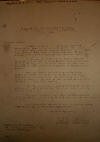
|
6 March
1929.
Letter from Major
H. H. Utley, Puerto Cabezas, to
Col. R. C. Berkley, USMC, Managua.
"Toribio
Hernandez, the Nicaraguan guide who
accompanied Edson and was wounded during
the engagement which took place on
February 8th near the Bentillo mountains
was evacuated to Puerto Cabezas. It was
necessary to amputate his left leg above
the knee. In view of the fact that he
volunteered his services, information is
requested regarding what provisions, if
any, the Nicaraguan Government will make
for him; and what steps are necessary to
initiate such action. This man has a
wife and four children now living at
Poteca and it is most desirable for our
prestige and to cover future
contingencies that some effort be made
to take care of him and his family after
his discharge from the hospital. This
is, of course, a most important factor
in gaining the good will of the
Nicaraguan people and obtaining their
help."
|
|
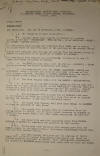
|
7 March 1929.
Field Order No. 9,
Major H. H.
Utley, Puerto Cabezas, to
command, p. 1.
"Map Reference:
Ham map of Nicaragua, 1924, 1:500000 ¶
1. a. No change in hostile dispositions.
¶ b. Captain Edson will operate in
command of a roving patrol in the CUA –
GUASANERAS – BOCA DE CUA – Upper
PANTASMA – GUALE – LA VIRGEN – PAVONA
Sector. ¶ The detachment 51st Company
has withdrawn from QUEPI and is moving
to LA LUZ where it will form part of the
garrison of the mining sector. ¶ Twenty
(20) enlisted 60th Company are moving
from the mining sector to WASPUC to form
part of the garrison of WASPUC and
AWAWAS. ¶ The detachment 59th Company
now at MASTAWAS, reinforced by one (1)
squad from BOCAY is moving to POTECA. ¶
2. A. The 29th Company takes over the
POTECA – GUIGUILI – FLORS Sector
relieving the Ship’s Detachments now
there. ¶ b. The detachments from the
TULSA, GALVESTON, DENVER and ROCHESTER,
(less 1 officer and about 25 enlisted)
with men of the 51st Company attached,
withdrew to PUERTO CABEZAS where the
ship’s detachments joins a ship of the
Special Service Squadron. ¶ c. The 60th
Company takes over the WASPUC – AWAWAS
Sector. ¶ 3. A. A Platoon of the 60th
Company under an officer will move about
two (2) days march westward on the
MATAGALPA – PIS PIS trail and establish
a base from which to operate against the
bandits. Report location of base when
established. D Day will be announced
later. ¶ c. One squad 60th Company will
move from CUVALI to CARROBO to form the
garrison of that place. ¶ d. Two squads
60th Company move in succession from the
mining sector to CUVALI; one of these
squads proceeds to GARROBO to reinforce
the squad there, the other squad
reinforces the garrison to CUVALI. ¶ e.
One squad 59th and 60th Companies moves
from PUERTO CABEZAS to WASPUC to
reinforce the garrison in that sector. ¶
f. Twenty nine (29) enlisted 59th
Company move from the WASPUC sector to
the BOCAY sector. Lieutenant CUNNINGHAM
follows when relieved from present
duties. ¶ g. The 59th Company will move
one (1) platoon of thirty seven (37)
enlisted forward from BOCAY retraining
at all times the minimum garrison
necessary at BOCAY. This platoon will
reestablish the outpost at MASTAWAS
garrisoning that place with at least one
squad . . . "
|
|
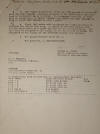
|
7 March 1929.
Field Order No. 9,
Major H. H.
Utley, Puerto Cabezas, to
command, p. 2.
" . . . 3. h. The
ship’s detachments (less one officer and
25 enlisted) with the 51st Company
personnel attached to the COCO Patrol
will withdraw by successive waves to
BOCAY. The personnel attached to ships
will be transferred to PUERTO CABEZAS
via WASPUC and CAPE GRACIAS in time to
reach CAPE GRACIAS by noon 1 April. ¶ 4.
a. Forty (40) mules with equipment are
being assembled at JINOTEGA for use in
this area. A patrol of the 60th Company
will require those mules at a point and
date to be announced later. Ten (10)
will be assigned to the supply of the
detachment at FLORS, the remainder to
the supply of the advanced platoon 60th
Company. ¶ b. See Administrative Order
No. 7. ¶ 5. See Annex No. 1,
COMMUNICATIONS. ¶ HAROLD H. UTLEY, ¶
Major, U.S. Marine Corps, ¶ Commander,
Eastern Area."
|
|
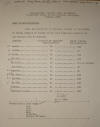
|
7 March 1929.
Memo to All Concerned,
1st Lt. W. C.
Hall, Puerto Cabezas.
"Troop movements
now in progress should, by the middle of
March, dispose of troops at the more
important outpost in the Eastern Area as
follows: ¶ STATION / STRENGTH OF
GARRISON (approxim.) / RADIO STATION
(contemplated) ¶ WASPUC . . . 25 . . .
YES ¶ AWAWAS . . . 12 . . . NO ¶ BOCAY .
. . 25 . . . YES ¶ POTECA . . . 25 . . .
YES ¶ GUIGUILI . . . 35 . . . NOT AT
PRESENT ¶ MASTAWAS . . . 12 . . . NO ¶
GARROBO . . . 16 . . . NO ¶ LA FLORS . .
. 32 . . . YES ¶ NEPTUNE . . . 15 . . .
YES ¶ LA LUZ . . . 25 . . . YES ¶ CUVALI
. . . 16 . . . YES ¶ YAOSCA-BIJAGUA . .
. 40 . . . YES" [SIGNED: W.C. HALL]
|
|
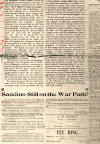
|
9 March 1929.
"Sandino Still on the Warpath?"
The
Bluefields Weekly.
"Two weeks ago we
published a statement that Sandino, the
now famous bandit and wholesale murderer
of Las Segovias had been liquidated.
This information we had gathered from
one of the reliable dailies of the
capital; but since then we have reasons
to believe the report was unfounded. ¶
The great desire to have Sandino and his
bloody deeds spoken of as things of the
past made the confident newspaper see
through the lens of an ardent wish. Now
we find LA PRENSA (Conservative) telling
of the appointment by the same Sandino,
of his new representative accredited
before the American Continent: ¶ THERE
WILL BE REPRESENTATIONS BEFORE ALL THE
COUNTRIES OF THE WORLD. ¶ “The
Salvadoran Press publishes the
following: “Principal Headquarters of
the Army of Defence of the Sovereignty
of Nicaragua. ¶ “The undersigned,
General and Supreme Chief of the Army of
Defence of the Sovereignty of Nicaragua,
in the exercise of the faculties
conferred on me by the same Army,
considering that Senor Froylan Turcios
presented his resignation as General
Representative of our Army in the
continent, which resignation has been
accepted on the 7th. Of the present
month. ¶ DECREES: ¶ Let said continental
representation be placed in charge of
the COMMITTEE HANDS OFF NICARAGUA, with
its seat in Mexico, D. F. empowering
said committee to make the designation
which it may deem necessary in the world
in general, but always in a collective
character in the same manner as it has
been conferred on said Committee in
order to avoid a monopoly of the
information proceeding from our
principal Headquarters, which is urgent
for our cause that the same be known
throughout the civilized world. ¶ Given
at El Chipoton, Nicaragua, C.A. January
18, 1929 and the 17th Year of
ANTI-IMPERIALISTIC STRUGGLE, in
Nicaragua. ¶ Patria and Liberty. ¶ A.C.
Sandino (signed and sealed)"
|
|

|
10 March 1929
(1530).
Radiogram from
Commander Southern Sector Bluefields
to Major H. H. Utley, Puerto Cabezas.
"FOLLOWING
INFORMATION FROM AMERICAN PRISONER
CAPTURED AT GREYTOWN BY GUARDIA NOW
CONFINED HERE QUOTE R E INITIALS
REYNOLDS OF GERMAN DESCENT OPERATES TRES
AMIGOS RANCHO SEVEN MILES SOUTH OF BOCA
SAN CARLOS ON SAN CARLOS RIVER AND RUNS
LAUNCH UP RIVER TO VICINITY OF SAN
CARLOS THENCE FORWARDING SUPPLIES
POSSIBLY ARMS NORTHWEST AND ALONG NORTH
COAST OF LAKE NICARAGUA REYNOLDS VERY
ANTI AMERICAN UNQUOTE 1530"
|
|
|
|
|
PREVIOUS
NEXT
|
|
|
|
|
|
|
|
